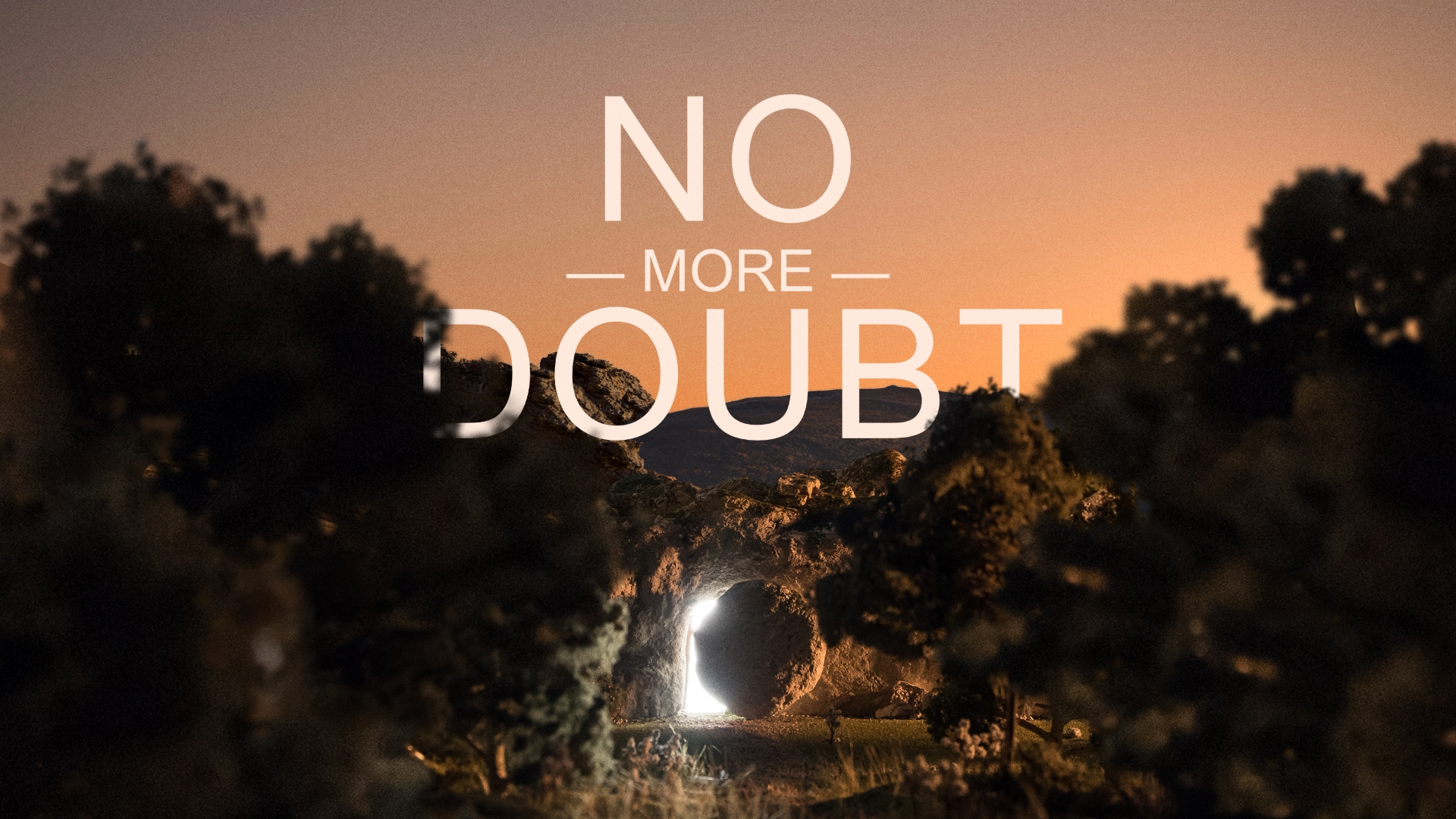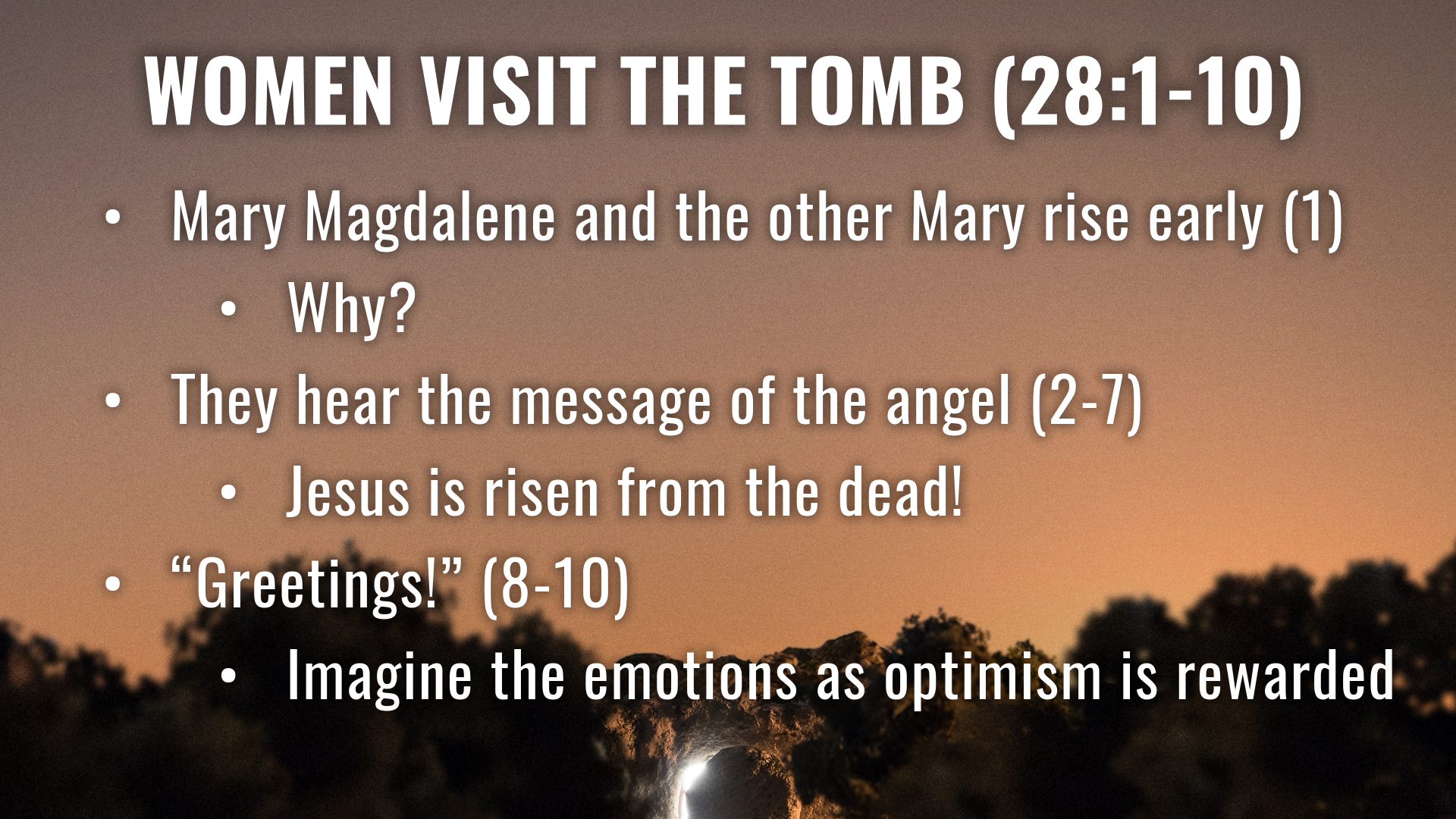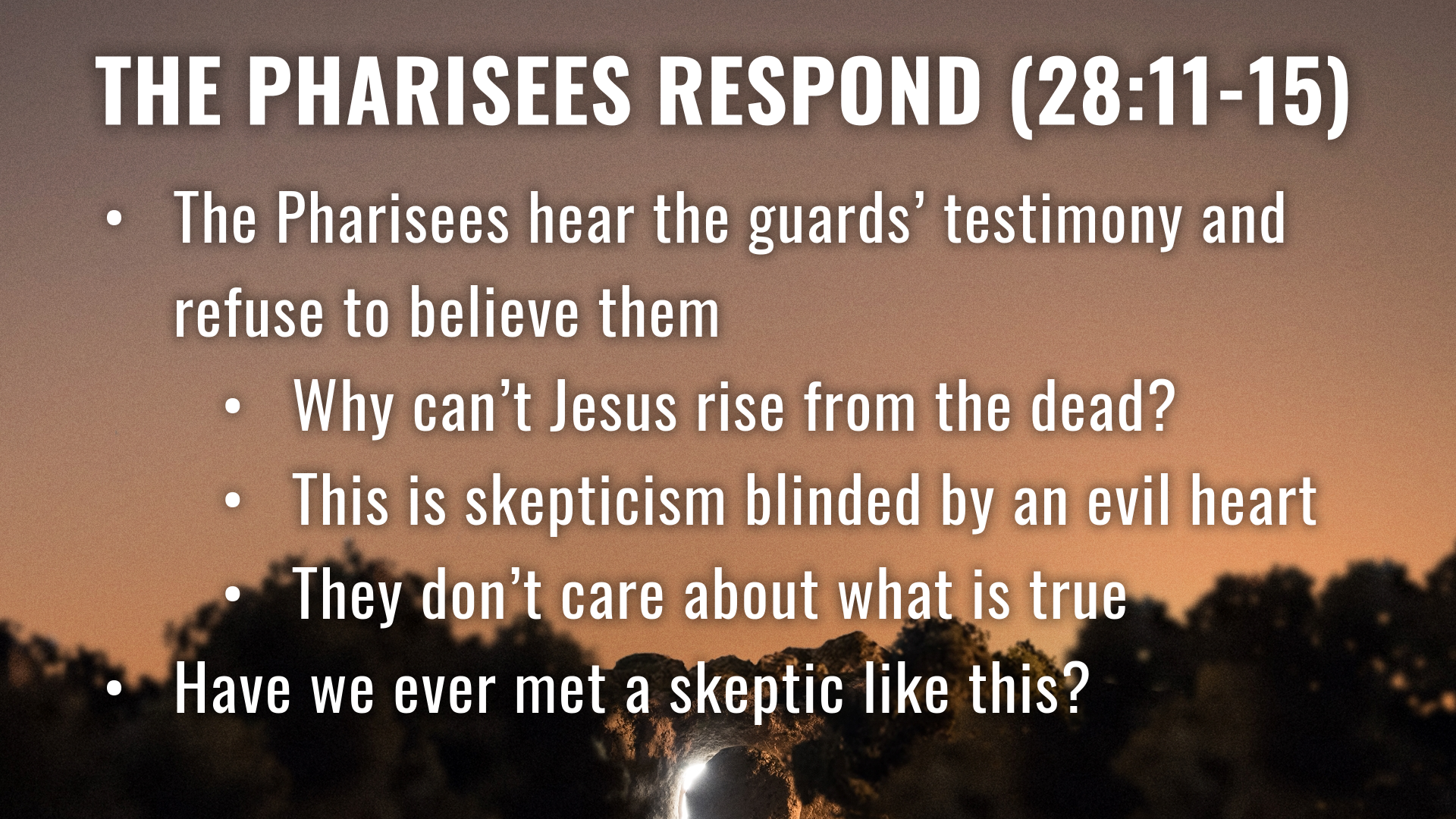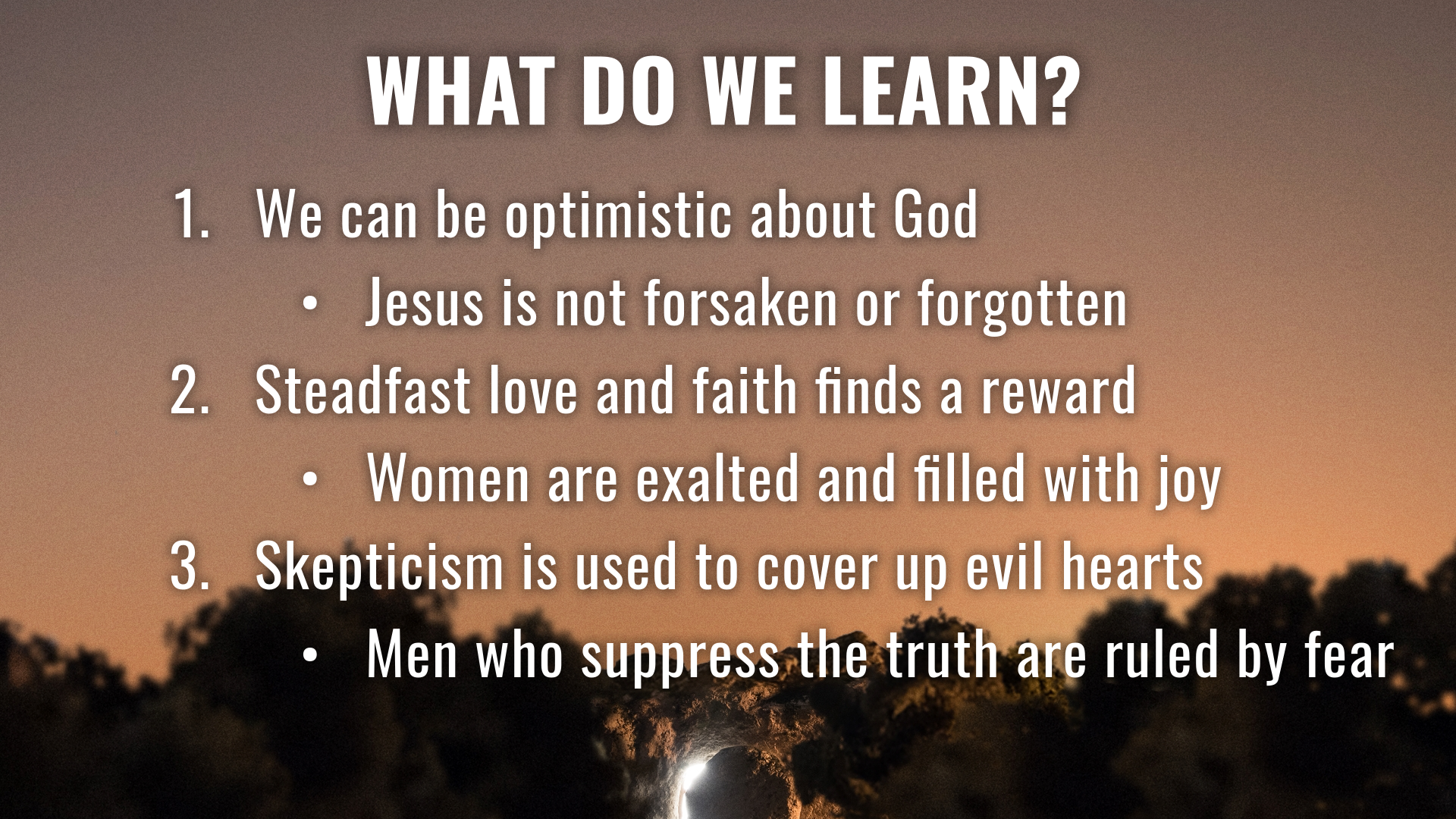No More Doubt (Matthew 27:62-28:15)
They call Gen X the skeptical generation, but skepticism has spread throughout our society for decades. In some ways, we value skepticism. Why is that? I have been skeptical of people for a long time, but that's not my nature. I'm naturally optimistic. I would rather be optimistic and open to believing that there is good in people. But when people take advantage of my optimism and hurt me, I shut that optimism down. Now, I feel like I'm in this constant battle trying to decide between optimism (which comes naturally) and skepticism (which is habitual).
Are you a skeptic and pessimist? Why is that better than being an optimist?
Our text this morning is the most significant event in the history of mankind because it signifies hope for life after death. Matthew designed this text to show us a contrast between skeptics and optimists. How we view this text has a significant impact on our attitudes and what we will do in our lives.
The Pharisees Prepare
So far, we have learned about Jesus dying on the cross and being buried in Joseph of Arimathea's tomb. +
Matthew 27:62--66 (ESV) --- 62 The next day, that is, after the day of Preparation, the chief priests and the Pharisees gathered before Pilate 63 and said, “Sir, we remember how that impostor said, while he was still alive, ‘After three days I will rise.’ 64 Therefore order the tomb to be made secure until the third day, lest his disciples go and steal him away and tell the people, ‘He has risen from the dead,’ and the last fraud will be worse than the first.” 65 Pilate said to them, “You have a guard of soldiers. Go, make it as secure as you can.” 66 So they went and made the tomb secure by sealing the stone and setting a guard.
In verse 62, we see that time has moved forward. The Jews spent the day after Jesus' death preparing for the Sabbath day. Then, the religious leaders come to Pilate on the Sabbath day to prepare for the disciples to steal Jesus' body. They claim that Jesus is an imposter and that his disciples will try to steal his body to say that he has risen from the dead. So Pilate gives them a guard to set up at the tomb and prevent access. He also has the tomb's stone sealed so that no one can go in or come out.
The Pharisees ensure that the disciples cannot deceive people. They were thinking ahead and wanted to prevent anything fake from being claimed. This works well with God's plan. If Jesus raises from the dead, it's not going to be something fraudulent. Jesus will have to do more than rising from the dead. He will have to move a sealed stone and defeat Roman soldiers.
The Pharisees go to sleep on Saturday night feeling like they have accomplished something on the Sabbath, which is ironic since it's supposed to be a day of rest. They are sure that they have defeated Jesus ultimately. No more contests of wisdom. No more contradicting Jewish traditions. No more tension between the leaders and the people. Everything is going to return to normal. The way they think it should be.
The Women Arrive
Matthew 28:1 (ESV) --- 1 Now after the Sabbath, toward the dawn of the first day of the week, Mary Magdalene and the other Mary went to see the tomb.
On the first day of the week, two of the three women mentioned earlier (27:55-56, 61) come back to the tomb. They were there when Joseph brought the body in. Then they went to prepare for the Sabbath. They rested on the Sabbath instead of trying to prevent evil from happening. Then, they woke up early on the first day of the week. It was "toward dawn," meaning the sun hadn't even risen yet, and they traveled up to see the tomb. Why would they travel to see the tomb? Matthew doesn't tell us. He leaves it hanging in the air for us to speculate. Other gospel accounts fill us in that they had prepared ointments for the body, but not Matthew. It's as though he wants us to believe that they were optimistic and hopeful, and maybe they were looking for Jesus to be raised from the dead. Notice what happens next.
Matthew 28:2--7 (ESV) --- 2 And behold, there was a great earthquake, for an angel of the Lord descended from heaven and came and rolled back the stone and sat on it. 3 His appearance was like lightning, and his clothing white as snow. 4 And for fear of him the guards trembled and became like dead men. 5 But the angel said to the women, “Do not be afraid, for I know that you seek Jesus who was crucified. 6 He is not here, for he has risen, as he said. Come, see the place where he lay. 7 Then go quickly and tell his disciples that he has risen from the dead, and behold, he is going before you to Galilee; there you will see him. See, I have told you.”
While they were on their way, there was an earthquake. Matthew tells us that there was an angel with an appearance like lightning and white clothes along with the earthquake. The guards saw this angel and became like dead men. But the women seem able to stand and listen to the angel. Isn't that a funny scene? These prominent Roman soldiers can't stand against this angel, but there isn't a hint that these women falter. That's because the angel has a message for the women. He tells them that Jesus has risen from the dead, and he sends them on a mission to tell the other disciples this good news.
Matthew 28:8--10 (ESV) --- 8 So they departed quickly from the tomb with fear and great joy, and ran to tell his disciples. 9 And behold, Jesus met them and said, “Greetings!” And they came up and took hold of his feet and worshiped him. 10 Then Jesus said to them, “Do not be afraid; go and tell my brothers to go to Galilee, and there they will see me.”
Notice in verse 8 that they had a mixture of great joy and fear. Can you imagine what it would be like to know that Jesus' body was not in the tomb? Can you imagine what it would be like to see the Roman guards all around the tomb-like dead men? I wonder if they said inside, "I knew he would be back!" these women had plenty of reason to be scared. They might be accused of something they did not do. What about standing in the presence of an angel and hearing that Jesus is alive? Imagine the surge of joy and excitement that you would feel from that.
There might be additional fear of telling people this good news, along with that joy and fear. What if they don't believe us? They are women in a society that suppresses the thoughts and testimony of women.
So these women start to leave with a mixture of emotions when they hear, "Greetings!" Jesus meets them. Notice what they did when they saw him. They took hold of his feet. Is that a typical way we would greet someone? It also says that they worshipped him. Why would they do that? They have known resurrected people before, but they recognize that Jesus is more than that. They knew what this meant. Jesus had said on multiple occasions that he must go to Jerusalem, suffer the crucifixion, and be raised on the third day. The fact that Jesus stands before them alive after they watched him die and saw his body buried in the tomb proves that he is who he says he is. He is truly the Son of God and the King of the Jews.
I love the optimism of these women and the consequential joy. Jesus' words to them are words of comfort and encouragement. They didn't need to be afraid. The fact that Jesus is alive means that everything will be okay for them. He's back! Now they need to tell people he's back and let them know that he wants them to go to Galilee.
The Cover-Up
Matthew 28:11--15 (ESV) --- 11 While they were going, behold, some of the guard went into the city and told the chief priests all that had taken place. 12 And when they had assembled with the elders and taken counsel, they gave a sufficient sum of money to the soldiers 13 and said, “Tell people, ‘His disciples came by night and stole him away while we were asleep.’ 14 And if this comes to the governor’s ears, we will satisfy him and keep you out of trouble.” 15 So they took the money and did as they were directed. And this story has been spread among the Jews to this day.
Matthew also includes details about what happened with the religious leaders and the guards. This is what happens when skepticism has gone too far. These guards felt the earthquake, they saw the bright light of the angel, and when they woke up, Jesus was gone. So the only logical explanation is that the disciples stole the body. There is another explanation. One could believe that Jesus rose from the dead, but the skeptical mind can't believe that. The Pharisees don't even acknowledge that as a possibility. Instead, they give the guards some money to back up the story they want to believe. It's an easy lie to tell. It keeps Jesus dead and makes the religious leaders comfortable. Believing that Jesus is the risen Christ is hard to navigate.
This section shows that they don't care about what is true. They care about what is convenient to them. They went from being skeptical to creating an alternate reality. Now all they need to do is pay people to bring that alternate reality to life. They don't just doubt. They refuse to believe.
What Do We Learn?
1. We can be optimistic about God.
In this part of the story, Jesus makes it clear that God has not abandoned him. Jesus remained faithful, and God did exactly what he said he would do. All of the anxiety, grief, and pain he went through was not for nothing. Remember him in the garden saying, "Please let this cup pass from me, yet not my will but yours be done." He put his faith and trust in God to bring him out the other side of death, to restore him, and to exalt him. God delivers on his promises. We can all rest assured that if we walk by faith and not by sight, God will also resurrect us.
2. Steadfast love and faith are optimistic and find their reward.
The main characters in this story are women. These women were always there to serve Jesus and take care of him. They loved him and believed in him no matter what. They were not deterred by his choice to submit to crucifixion. They did not abandon him at any point. They even stood there watching Jesus hang on the cross without becoming skeptical. While all of the Lord's disciples cower in fear, they prepare ointments, wake up early, and head to the tomb.
Jesus was true to who he was, and these women were faithful to him. This faithfulness finds a reward as these women were the first to see the Lord after his resurrection, and they were the first given the privilege to spread the good news about his resurrection. Their cautious optimism leads them to great joy!
3. The skeptic is in danger of creating a false reality.
The Pharisees try to prevent someone from stealing the body. But when Jesus is raised from the dead, they accuse the disciples of stealing it. Then, they pay the guards to back up their speculation. Here we see that their evil, unbelieving hearts will not change. They have already decided before considering any evidence that Jesus cannot be the Son of God, and he cannot rise from the dead.
At the root of this decision is fear of the consequences they might face from the people or Pilate, but they should be scared of Jesus, who was resurrected from the dead!
Application
So how does all of this relate to us? Are you optimistic about God's promises? God has promised to be with us in all of our trials. He has promised to forgive all of our sins, to hear our prayers, to fill us with joy and peace, and to give us eternal life with an eternal inheritance. Would you call yourself optimistic about these promises?
How would an optimistic person act? Wouldn't they see every circumstance in light of those promises? Thinking about the worst possible thing doesn't help us get the most out of life. It makes us miss out on the best life has to offer. Does assuming the worst in people help our relationships or hurt them? Am I saving myself by putting up barriers and keeping people from hurting me? The truth is that doubt, skepticism, and the rebellion that results are all rooted in fear and selfish preservation.
Have you ever been so scared of someone taking advantage of you that you refused to let people get close? Maybe it's not about people taking advantage of you. Maybe you fear humiliation, failure, or pain more than you desire relationships with other people or to believe the truth. The safe thing to do is assume the worst in people, doubt their goodness, and put up barriers. That's what the religious leaders do.
What if we didn't do the safest thing? What if we assumed the best? Is that not what love does?
1 Corinthians 13:4--8 (ESV) --- 4 Love is patient and kind; love does not envy or boast; it is not arrogant 5 or rude. It does not insist on its own way; it is not irritable or resentful; 6 it does not rejoice at wrongdoing, but rejoices with the truth. 7 Love bears all things, believes all things, hopes all things, endures all things. 8 Love never ends. As for prophecies, they will pass away; as for tongues, they will cease; as for knowledge, it will pass away.
It might not be the easiest to navigate, but it will result in the best reward. If we believe that Jesus did die for our sins, how would we feel toward God? If we believe Jesus was raised from the dead and promised to raise those who submit to him, how would we live? If we assume that the people in this room love us, how would we respond when they invite us to join them?
Invitation
This whole time, we looked closely at the trees, but not the forest. Isn't it amazing that this text tells us Jesus has been raised from the dead! How amazing is that? Do you doubt that? We read in 1 Corinthians 15 that over 500 men and women saw Jesus after he died on the cross. How do you explain that many eyewitnesses claim to have seen Jesus less than 20 years after it took place? We can't assume that it's all mythological or made up. These people aren't all delusional. They wouldn't make this up because believing it gave them no advantage.
1 Corinthians 15:16--18 (ESV) --- 16 For if the dead are not raised, not even Christ has been raised. 17 And if Christ has not been raised, your faith is futile and you are still in your sins. 18 Then those also who have fallen asleep in Christ have perished.
Many people believe that it has been advantageous to call yourself a Christian in our day. Back then, it was committing social, economic, and career suicide. They wouldn't submit if it weren't true. Also, please don't believe that these people are more susceptible to deceit than we are. Their doubts were as strong as our doubts. Some of the disciples refused to believe until they touched Jesus themselves. The problem isn't a lack of evidence. The problem is doubting the truth so much that we become overly skeptical and make up lame excuses like the disciples stole his body.
This event changed history. Over a few years, Christ's followers spread throughout the world. Men and women believed that Jesus rose from the dead, and they gave their lives to him so they could live with him forever. What about you?







